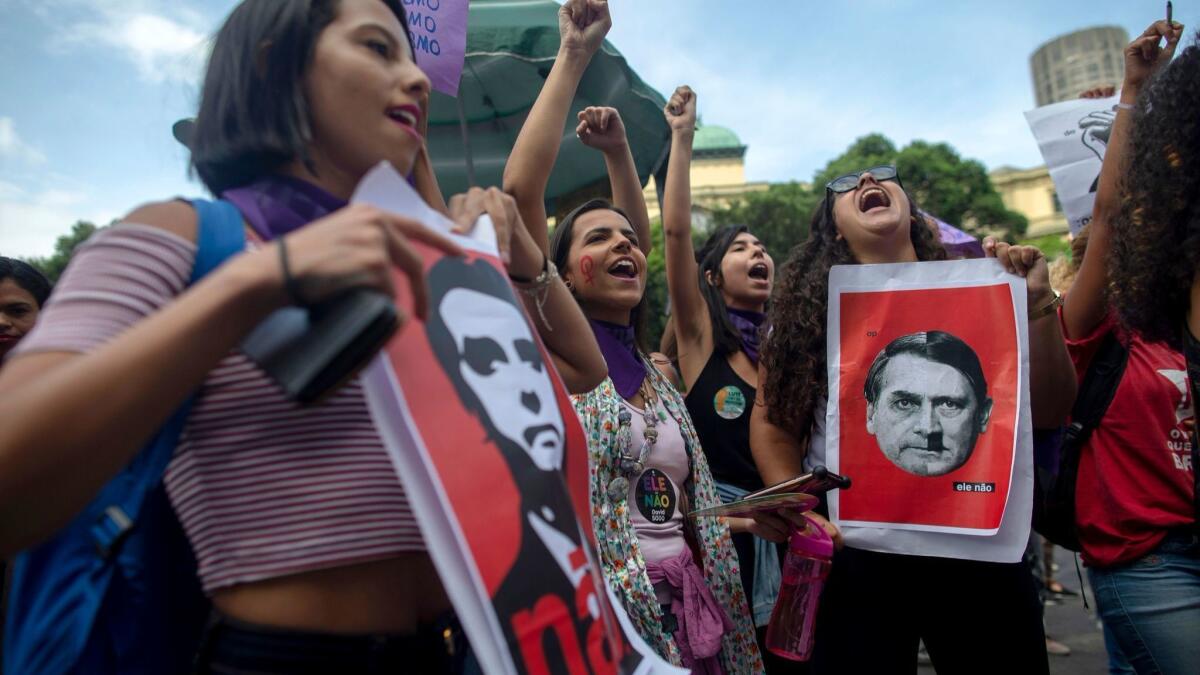Hundreds of thousands of women across Brazil march against far-right presidential candidate

- Share via
Reporting from São Paulo, Brazil — Hundreds of thousands of women across Brazil took to the streets Saturday to protest the presidential candidacy of far-right hopeful Jair Bolsonaro, known for making disparaging comments against women and other minorities, as well as supporting the use of torture.
“I’m part of a portion of society that is greatly affected by the types of things [Bolsonaro] says and thinks,” said Camila Ferreira, a 37-year-old psychoanalyst and art educator who attended the demonstration in São Paulo. “This conservative wave, which has really always existed in Brazil, needs to come to an end. Feminism needs to become more prominent in our society. Women need to be seen and treated as complete and equal people.”
Support for Bolsonaro received a boost after he was stabbed Sept. 6 at a campaign rally in the town of Juiz de Fora. He was expected to be released from the hospital Friday after recovering from a second surgery in São Paulo, but an infection delayed his exit until an hour before the protests against his candidacy began. The hospitalization hadn’t stopped him from speaking to his supporters from his bed in a series of videos posted to social media.
The most recent poll from the Brazilian Institute of Public Opinion and Statistics, known as Ibope, shows Bolsonaro holds a lead with support of 27% of intended voters, far below the 50% required to avoid a runoff. The women’s vote could prove decisive in a final round, when Bolsonaro would likely go head-to-head with former São Paulo Mayor Fernando Haddad, 55, who replaced former President Luiz Inácio Lula da Silva on the Oct. 7 ballot when he was ruled ineligible to run because of a bribery conviction.
According to Ibope, 50% of women said they would not vote for Bolsonaro under any circumstances.
Leîda Queiroz, a 77-year-old member of Brazil’s Communist Party who spent her youth fighting the country’s military dictatorship, said she fears its return if Bolsonaro wins election.
“[The dictatorship] could definitely come back,” she said while attending the protest in São Paulo. “I know what it’s like to live with that kind of oppression. I was imprisoned four times. But this act will be a part of Brazil’s history. We’ll show everybody that we’re against Bolsonaro and what he stands for. We can’t let what happened before happen again.”
A social media campaign called #EleNão — or #NotHim — was started weeks ago in reaction to Bolsonaro’s continuing lead in the polls. Its original Facebook group, “Women United Against Bolsonaro,” now has more than 3.8 million members, and hundreds of thousands of people signed up for the marches Saturday.
Men and women in the crowds carried hand-painted banners and signs and denigrated Bolsonaro’s position that women do not deserve to be paid the same as men because they get pregnant. He has also described a fellow member of Congress as too ugly to rape.
The nonpartisan anti-Bolsonaro campaign — organizers have reiterated that everyone is welcome no matter who they plan to vote for, as long as it is not Bolsonaro — has drawn the support of Brazilian musicians including Gilberto Gil and Caetano Veloso, both exiled during the military dictatorship.
The protest in São Paulo brought out politicians from parties that oppose Bolsonaro, including Ivan Valente, a congressman for the left-wing Socialism and Liberty Party.
“This is a strong societal reaction to a candidate that is a threat to the entire Brazilian population,” he said. “And it’s because of all of these women coming together to fight for their rights that we have a chance at avoiding taking several steps backward [by electing Bolsonaro].”
A longtime conservative congressman and former army captain, Bolsonaro has caused outrage across Brazil with his vocal support of torture and his desire to loosen gun laws in a country where more than 62,000 homicides were reported in 2016, nearly 72% of which were gun-related.
But it’s his tough stance on lowering Brazil’s rising crime rate — Bolsonaro wants to make it easier for civilians to buy guns and give police more liberty to shoot suspected criminals — that many of his supporters say is a key reason they will cast their votes for him. They also like his support of what he terms traditional family values and his promise to fight political corruption as one of the few politicians who hasn’t been implicated in Brazil’s wide-reaching Lava Jato, or Car Wash, corruption investigation. His tough talk and controversial statements have garnered him comparisons to President Trump.
Langlois is a special correspondent.
More to Read
Sign up for Essential California
The most important California stories and recommendations in your inbox every morning.
You may occasionally receive promotional content from the Los Angeles Times.













